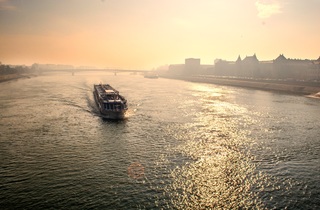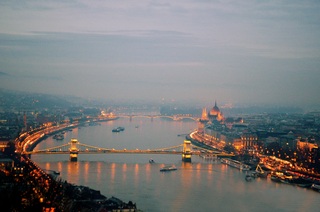Danube cruises enjoy huge popularity, offering luxury, nature and culture. While guests are being spoilt above-board, however, the crews of those ships, working under precarious conditions for low wages, are having a very different experience.
Luxury cruises hugely popular
Danube cruises are the epitome of luxury and romance. Numerous providers of the cruises are now operating, with some starting out in Romania and travelling west to Linz, with others taking the opposite route or along a particular section of the Danube. Costs vary widely according to the duration of the cruises, season and cabin class, and passengers enjoy exquisite wines, a wide-ranging cultural programme and breathtaking panoramas. High-class entertainment is provided on the ship, with a gala evening just one example. The guests have their every possible wish fulfilled, and want for nothing.

But how is life for the crews who make such luxury possible, all those chefs, waiters, waitresses and cleaning staff?

Harsh wind on board
The International Labour Organisation of the United Nations (ILO) has carried out checks on a random basis. According to their report, many of the people employed on the ships earn far less than 2.80 euros an hour, and a net monthly wage of just 800 euros. Their working days can last up to 14 hours, and employees’ living conditions are an insult, with two or three people housed in a tiny cabin without windows, and is cramped, stuffy and loud.
Abuses on a ship are significantly more difficult to check than they are at a company operating on land. The industry is small and “mobile”, says Austrian trade union Vida, which is responsible for cruise ship employees. Even on ships which start in Austria, the place of work of the staff is usually abroad.
Workers from impoverished countries
The economy in Austria, primarily Vienna, benefits hugely from Danube tourism. In 2023, around 440,000 people took a cruise on the Danube either departing from or passing through Austria, generating value of around 139 million euros. In recent years, cruises on the Danube have become particularly popular amongst American and Chinese tourists.
The leading Austrian provider in the river cruise sector, Lüftner Cruises, presents itself as an ”Austrian family-owned company”. The company’s 14 “Amadeus” ships travel the Danube, Seine, Rhône, the Saône and numerous other rivers. In Austria, however, the company only acts as a travel agent. Crew members on the ships – including the captains, officers, mechanics and workers providing hotel and gastronomic services – are employed via companies in Romania, Cyprus or Switzerland, which, in turn, recruit via agencies in Indonesia or Mauritius. In total, the network of this cruise giant includes more than ten companies at home and abroad. This leads to a situation whereby the company generated a turnover of around 70 million euros in 2022 with just 23 employees on fixed contracts, 20 million euros of which was profit.

The end of the food chain
Responding to an enquiry by the STANDARD, the company justifies its position by saying that its approach is normal in the industry. Corporate consultant Sebastian Frankenberger can confirm the “problem with the industry”. Active in Vienna and Passau, he has years of experience in the sector. Unfortunately, he says, it’s often the case that behind those shipping lines, cruise operators, travel agencies and employers of captains, mechanics, hotel and restaurant staff, a string of different companies are involved. This kind of outsourcing is often problematic for those affected: “If everything continues to be based on outsourcing, then I, as an employee, will earn less and less – and be at the very end of the industry’s food chain.”
Anarchy on an international waterway
The problem lies in the fact that the Danube is considered an “international waterway”. That means that where the seat of a cruise ship company is not in Austria, domestic labour law does not apply on the Austrian Danube either. At present, the legal situation favours companies which move their seat to countries in which “labour costs are taxed less than in Austria”, says Wolfram Mosser-Brandner, Chair of the Professional Group for Shipping at the Chamber of Commerce. In his view, unified Europe-wide standards would be desirable, “for reasons of competitiveness”.
Companies in the industry could easily afford to pay their employees on the basis of Austrian standards. But those guests would certainly have to pay more for their cruises. In order to pay those employed on the ships fairly, the companies’ costs would have to approximately double, Mosser-Brandner believes.
Translated by Tim Lywood
#Donau #Kreuzfahrt #Luxus #Ausbeutung #BilligArbeitskäfte #AgainstHumanTrafficking #GegenMenschenhandel #EndExploitation #EndTrafficking #HopeForTheFuture #Österreich
